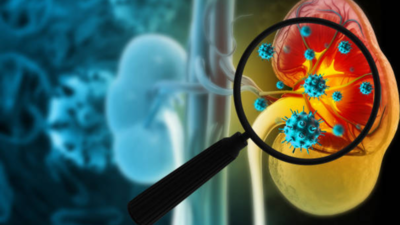- News
- lifestyle
- health-fitness
- health-news
- Girl diagnosed with end-stage kidney failure after showing flu symptoms for 3 months: Report
Trending
Girl diagnosed with end-stage kidney failure after showing flu symptoms for 3 months: Report
Lilly, a 14-year-old girl, has been diagnosed with end-stage kidney failure and is undergoing regular dialysis. She experienced severe pain and was placed in a coma for three days at Bristol Children's Hospital. Doctors suggest she may need a transplant in the future as her kidneys have nearly stopped functioning.

(Representational image)
For 14 year old Lilly's parents the diagnosis came as a nightmare when doctors announced that she suffers from end-stage kidney failure. Lilly showed flu-like symptoms for three months.
"She is now living with the condition and undergoing dialysis several times a week," BBC reported. Lilly is undergoing dialysis on a regular basis but doctors are of the opinion that she might need a transplant right in the future. In Lilly's case of Lilly, she was under immense pain. "Lilly said she was "kind of relieved" when she was told she would be put in a coma, as she was in “so much pain”," the media report said. She was then shifted to the paediatric intensive care unit (PICU) at the Bristol Children's Hospital, where she spent three days in a coma.
In Lilly's case of Lilly, she was under immense pain. "Lilly said she was "kind of relieved" when she was told she would be put in a coma, as she was in “so much pain”," the media report said. She was then shifted to the paediatric intensive care unit (PICU) at the Bristol Children's Hospital, where she spent three days in a coma.
End-stage kidney failure is when the normal functioning of the kidneys have almost come to halt. "Your kidneys filter wastes and excess fluids from your blood, which are then excreted in your urine. When your kidneys lose their filtering abilities, dangerous levels of fluid, electrolytes and wastes can build up in your body. With end-stage renal disease, you need dialysis or a kidney transplant to stay alive," MayoClinic explains.
There are several reasons why an individual develops end stage kidney disease including diabetes, high blood pressure, drug abuse, blockages in urinary tract, family history and certain genetic conditions.
"She is now living with the condition and undergoing dialysis several times a week," BBC reported. Lilly is undergoing dialysis on a regular basis but doctors are of the opinion that she might need a transplant right in the future.

End-stage kidney failure is when the normal functioning of the kidneys have almost come to halt. "Your kidneys filter wastes and excess fluids from your blood, which are then excreted in your urine. When your kidneys lose their filtering abilities, dangerous levels of fluid, electrolytes and wastes can build up in your body. With end-stage renal disease, you need dialysis or a kidney transplant to stay alive," MayoClinic explains.
The common symptoms seen during this stage are nausea, vomiting, loss of appetite, fatigue, changes in urination pattern, chest pain, shortness of breath, swelling of feet, swelling and ankles, high blood pressure, headache, difficulty sleeping, decreased cognitive functioning, muscle twitches, itching and having metallic taste. In some individuals, just like the case of Lilly, few symptoms are prominent which might be one of the reasons why her parents did not identify the disease and assumed it to be flu.
There are several reasons why an individual develops end stage kidney disease including diabetes, high blood pressure, drug abuse, blockages in urinary tract, family history and certain genetic conditions.
Simple lifestyle changes to avoid kidney stones
End of Article
FOLLOW US ON SOCIAL MEDIA










